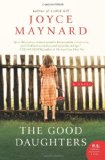Summary | Excerpt | Reading Guide | Reviews | Beyond the Book | Readalikes | Genres & Themes | Author Bio

A Novel
by Joyce Maynard
Driving home that afternoon, we passed him on the road—his long, angular
form cruising on his board. He didn’t see me, but for that one flash of time, I
had taken in his face. Long enough to decide I loved this boy.
To my brother and me, our parents went by their first names, Valerie
and George. In all the years we lived with them, I don’t think we ever
called them Mom or Dad. It said a lot, our not using those names for them. I’m
not sure I ever felt I had parents. Not parents as you normally think of them,
anyway.
It’s an odd feeling, growing up in a family where it seems like the adults
are the ones who need to grow up. Even when I was very young, I felt that way.
They just seemed so unreliable to me. They were so wrapped up in themselves
they sometimes seemed to forget they had children.
I was five or six when George quit his job selling ad space at the newspaper in
Concord, to write a novel about life on another galaxy where the people
wore no clothes. This was the only thing I remember about George’s book. Even when I
was little, this fact shocked me. George’s goal was to become a world-renowned
writer, which was why we left New Hampshire, the place I was born.
Valerie’s father had just died, and her mother was dead already, and since
there were no brothers or sisters, she inherited what he had. This wasn’t much,
considering her dad had been a steelworker all his life, but it was enough for
George to decide to quit his job and sell the house and live off that money until
his ship came in as an author. His goal was not to be simply a writer but “an
author.” I never understood what the difference was.
Meanwhile, we’d live in Valerie’s father’s old place, just outside of Pittsburgh.
Even then I remember thinking, what if this ship doesn’t come in? I had
heard George telling the story for this novel of his—it was something he liked
to do on long car rides when we were going somewhere, as was often the case,
but every time he did, my mind would wander, which didn’t seem like a good
sign. My brother, Ray, also a lover of fantasy, had read me a couple
of J. R. R. Tolkien books by now, and C. S. Lewis, and though they were never really my
style, either, I could tell a good fantasy from one that made no sense, meaning
the kind George was writing.
As for me, as soon as I could read I gravitated to nonfiction, biographies
mostly, of people like Annie Oakley and George Washington Carver. Also true
stories about animals and nature. My all-time favorite was Ring of Bright Water,
about a pair of otters. I loved it that the illustrations were photographs.
I worried that while we were waiting for that ship of his, George would
spend all the money. If he didn’t sell his book, then where would we be? I was
in the third grade at this point, but as it turned out I was right. Where we would
be, and were, was in a trailer park in Pennsylvania, and after that, a house in
Vermont without indoor plumbing. It’s unclear to me now how George and Valerie
decided on these places for us to settle down, for a while anyway. We never
stayed for long.
We were living in the Vermont house when George announced that he
was going to become a country-and-western songwriter. He had an idea for a
romantic ballad that would be perfect for Les Paul and Mary Ford—though by
the time he got it together to record his demo, they were getting divorced. But
even without the problem of the singers’ relationship, there seemed to be some
pretty big obstacles to this plan.
“Don’t you have to know how to play the guitar or something if you want
to write songs for people?”
I said. He thought this was a good idea, and bought
one, along with a book on how to learn to play guitar in fourteen days. I did not
find this reassuring.
Excerpted from The Good Daughters by Joyce Maynard. Copyright © 2010 by Joyce Maynard. Excerpted by permission of William Morrow. All rights reserved. No part of this excerpt may be reproduced or reprinted without permission in writing from the publisher.
Your guide toexceptional books
BookBrowse seeks out and recommends the best in contemporary fiction and nonfiction—books that not only engage and entertain but also deepen our understanding of ourselves and the world around us.